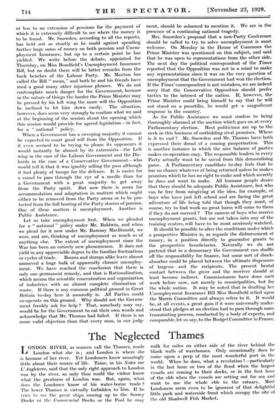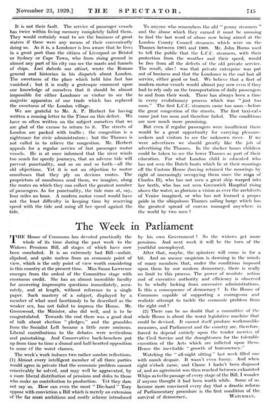The Neglected Thames
TONDON RIVER, as seamen call the Thames, made I London what she is ; and London is where she is because of her river. Yet Londoners know amazingly little about their source of life. Taine, in his Notes sur L'Angleterre, said that the only right approach to London was by the river, as only thus could the visitor know what the greatness of London was. But, again, what does the Londoner know of his water-borne trade ? The lower Thames is virtually forbidden to'iiim. If he tries to see the great ships coming up to the Surrey Docks or the Comm-Teial Docks or the Pool he may walk for miles on either side of the river behind the blank walls of warehouses. Only occasionally does he come upon a peep of the most . wonderful port in the world. When he does, what a revelation !—particularly in the last hour or two of the flood when the largest vessels are coming to their docks, or in the first hour of the ebb when the vessels are setting out for sea and want to use the whole ebb to the estuary. Most Londoners seem even to be ignorant of that delightful little park and waterside front which occupy the site of the old Shadwell Fish Market. It is not their fault. The service of passenger vessels has twice within living memory CoMpletely failed them. They would certainly want to see the business of great Waters if there were any means of their conveniently doing so. As it is, a Londoner is less aware that he lives in a great port than the citizen of Liverpool or Bristol or Sydney or Cape Town, who from rising ground in almost any part of his city can see the masts and funnels of ships. Loci dulcedo nos attinet, wrote the Roman general and historian in his dispatch about London. The sweetness of the place which held him fast has vanished ; but it is really a grotesque comment upon our knowledge of ourselves that it should be almost impossible for either Londoner or visitor to see the Majestic apparatus of our trade which has replaced the sweetness of the London village.
We are grateful to Mr. A. P. Herbert for having written a rousing letter to the Times on this defect. We have so often written on the subject ourselves that we are glad of the excuse to return to it. The streets of London are packed with traffic ; the congestion is a nightmare for civic administrators ; but the Thames is not called in to relieve the congestion. Mr. Herbert appeals for a regular service of fast passenger motor vessels. He is at once informed that the river winds too much for speedy journeys, that an adverse tide will prevent punctuality, and so on and so forth—all the old objections. Yet it is not an objection to motor omnibuses that they ply on devious routes. The proprietors of omnibuses send them, we imagine, along the routes on which they can collect the greatest number of passengers. As for punctuality, the tide runs at, say, "four miles an hour. A modern motor vessel would have not the least difficulty in keeping time by reserving 'speed with the tide and using all her speed against the tide. To anyone who remembers the old " penny steamers " and the abuse Which they earned it must be amusing to find the last word of abuse now being aimed at the London County Council steamers which were on the Thames between 1905 and 1908. Mr. John Burns used to tell the public that the L.C.C. steamers, with their protection from the weather and their speed, would be free from all the defects of the old private service. The result, alas ! was that private enterprise was put out of business and that the Londoner in the end lost all service, either good or bad. We believe that a fleet of modern motor vessels would almost pay now even if they had to rely only on the transportation of daily passengers to and from their work. There has always been a time in every evolutionary process which was " just too soon." The first L.C.C. steamers came too soon—before the great congestion of the streets. The first taxi-cabs came just too soon and therefore failed. The conditions are now much more promising.
But even if regular passengers were insufficient there would be a great opportunity for carrying pleasure- seekers and visitors to see the unknown river. If we were advertisers we should greatly like the job of advertising the Thames. In the slacker hours children could be taken to see the lower Thames as part of their education. For what London child is educated who has not seen the Dutch boats' which lie at their moorings off the Custom House (having retained the moorings by right of unceasingly occupying them since the reign of Charles II), who has not seen a great ship warped into her berth, who has not seen Greenwich Hospital rising above the water, as glorious a vision as ever the architects of Venice imagined, or who has not learned a proper pride in the ubiquitous Thames sailing barge which has the greatest spread of canvas managed anywhere in the world by two men ?































































 Previous page
Previous page